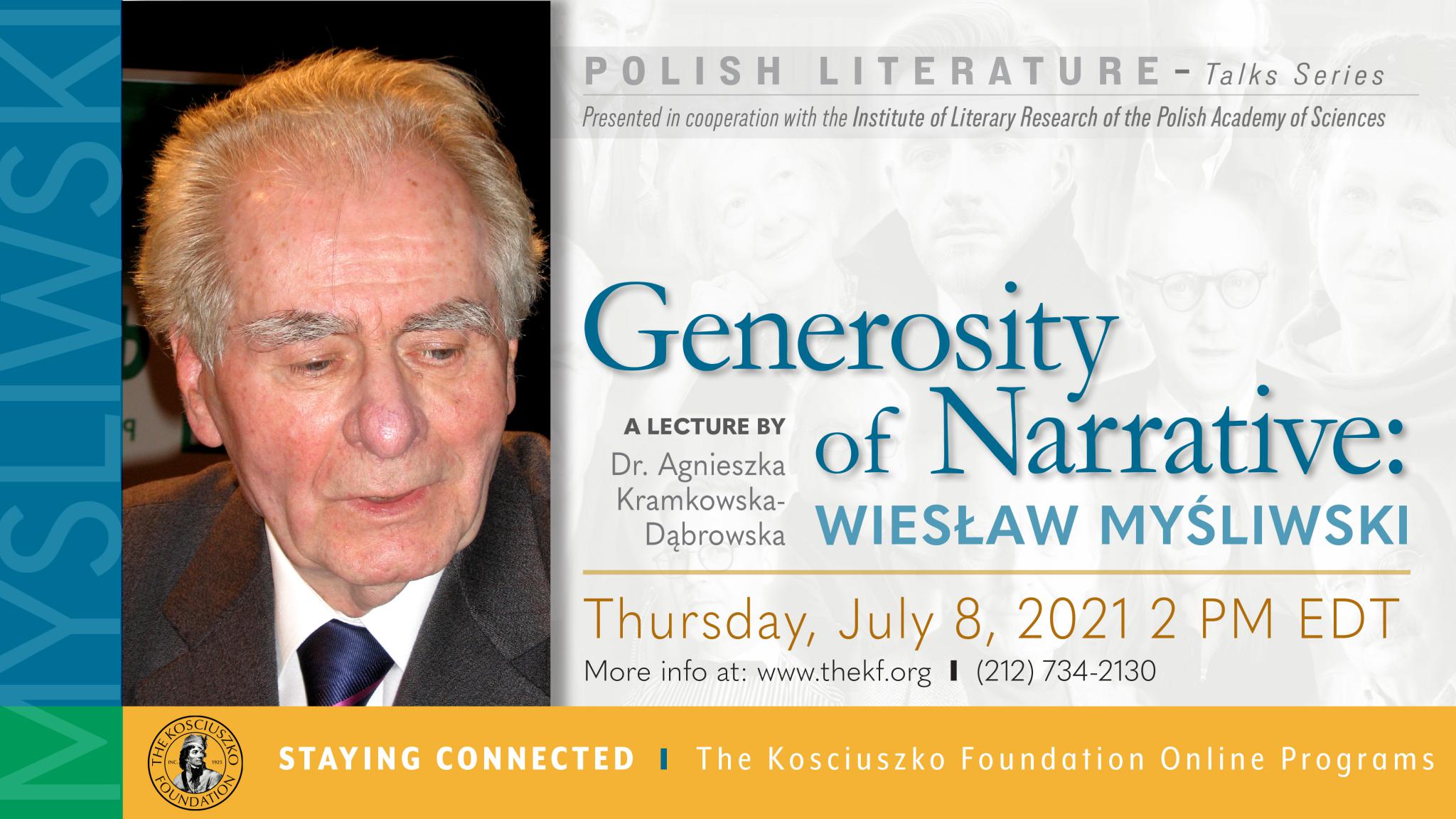Event
Generosity of Narrative: Wiesław Myśliwski – A lecture by Dr. Agnieszka Kramkowska-Dąbrowska
Wiesław Myśliwski (b. 1932) is one of the few living writers who made their debut more than fifty years ago and, due to the importance of their works published at that time, belong to the history of literature of the 20th century. At the same time, Myśliwski successfully entered the 21st century and settled there well. What is the secret of this writer's duration? What is the key with which Myśliwski opened his readers' minds in the last century and still works?

Perhaps it is the narrative itself, the ability to tell a story – rich in details, meandering threads, but always trying to put together scattered parts just as human life is composed of scattered events. People have always needed a story – both as listeners and speakers. They needed it in the complex 20th century and still need it in the 21st century, which increasingly disintegrates human personality. The need for a story is evidenced by the popularity of Myśliwski's books then and now. In the human activity distinguished by the writer, which is the activity of telling stories, it is of course also important what is their subject, or rather, what emerges from them. Drawing on people's former spirituality from the countryside, Myśliwski creates his protagonists – experienced in life and history, who refuse to let their fate be marked by randomness. The writer sometimes makes his characters look for a very fragile meaning under the surface of events, and the readers – under the surface of a story in which questions arise about the role of memory, relations with other people, and the fight against destiny in building their own identity.
The talk will be based on three novels translated into English: Stone Upon Stone, A Treatise on Shelling Beans, and The Palace (one of Myśliwski's first books). Reference will be also made to the masterpiece of the novel Widnokrąg (Horizon).
WEDNESDAY, JUNE 2, 2021, AT 2:00PM
Agnieszka Kramkowska-Dąbrowska holds a Ph.D. degree in humanities, works at the Institute of Literary Research of the Polish Academy of Sciences. Her research interests include the literature of the 20th and 21st centuries and Polish dramaturgy of the present and the past centuries. Her interests also include editing, archiving, and analysis of the creative process. She also researches in the field of digital humanities. She is the author of two monographs: Gabinet luster. Śmiech w twórczości Zbigniewa Herberta (2015) and Janusz Krasiński. Świadectwo (2020). She edited (together with Halina Herbert-Żebrowska) Zbigniew Herbert's letters to his family (Zbigniew Herbert. Korespondencja rodzinna) and volumes of plays: by Janusz Krasiński (Krzak gorejący. Dramaty, 2013) and by Władysław Terlecki (Krótka noc. Dramaty, 2016).
The lecture is presented in cooperation with the Institute of Literary Research of the Polish Academy of Sciences and is part of the Tadeusz Solowij Lectures of the Kosciuszko Foundation.
Information
See also
Vladimir Nabokov and the Fictions of Memory
Almost 40 years after Nabokov's death his texts continue to function as literary Fabergé eggs in which scholars keep finding hidden surprises and previously overlooked details. As Nabokov wrote in Conclusive Evidence, "the unravelling of a riddle is the purest and most basic act of the human mind." However, readers and critics are divided on the issue of whether Nabokov is a postmodern riddle-maker enjoying the game itself without enabling the player to reach the ultimate solution, or whether the riddles are solvable by a reader astute enough to follow all the sophisticated patterns and allusions which point to Nabokov's metaphysical convictions.
Władysław Reymont through the prism of film adaptations (Andrzej Wajda and others) - A lecture and multimedia presentation by Prof. Tomasz Żukowski
On June 8, Prof. Tomasz Żukowski will examine Reymont’s texts and their adaptations in the context of the discussion about how national history relates to the history of social groups and the conflicts between them. The lecture is presented in cooperation with the Institute of Literary Research of the Polish Academy of Sciences and is part of the Tadeusz Solowij Lectures of the Kosciuszko Foundation.
XXVIII Scientific Readings / International Scientific Conference
The annual international conference “Scientific Readings” organized by the Faculty of Humanities (FH) of Daugavpils University (DU) is a big research event that represents the major spheres of the humanities, research subjects, methodologies, and interdisciplinary innovations at the faculty.
GENESIS – CRACOW 2019. Genetic Criticism: from Theory to Practice
Faculty of Polish Studies at the Jagiellonian University in Cracow and Institut des Textes & Manuscrits Modernes (ITEM) in Paris are pleased to invite you to participate in the international conference GENESIS – CRACOW 2019. GENESIS – CRACOW 2019 will be the second edition of a new series of conferences on genetic criticism, understood as the study of the creative process. The first edition, held on 7-9 June 2017 in Helsinki (Finland), was organized by the Finnish Literature Society and Institut des Textes & Manuscrits Modernes in Paris. The participants included scholars from Finland, France, Austria, Belgium, England, Germany, Ireland, Italy, Lithuania, Netherlands, Poland, Russia, Tunisia, Turkey, Wales and Canada.